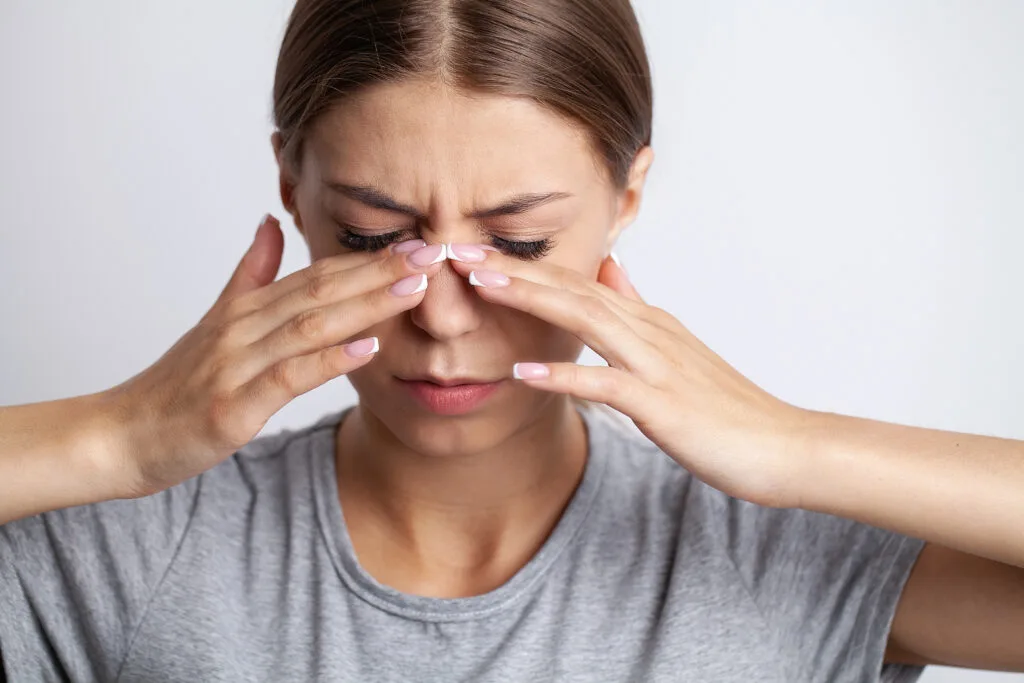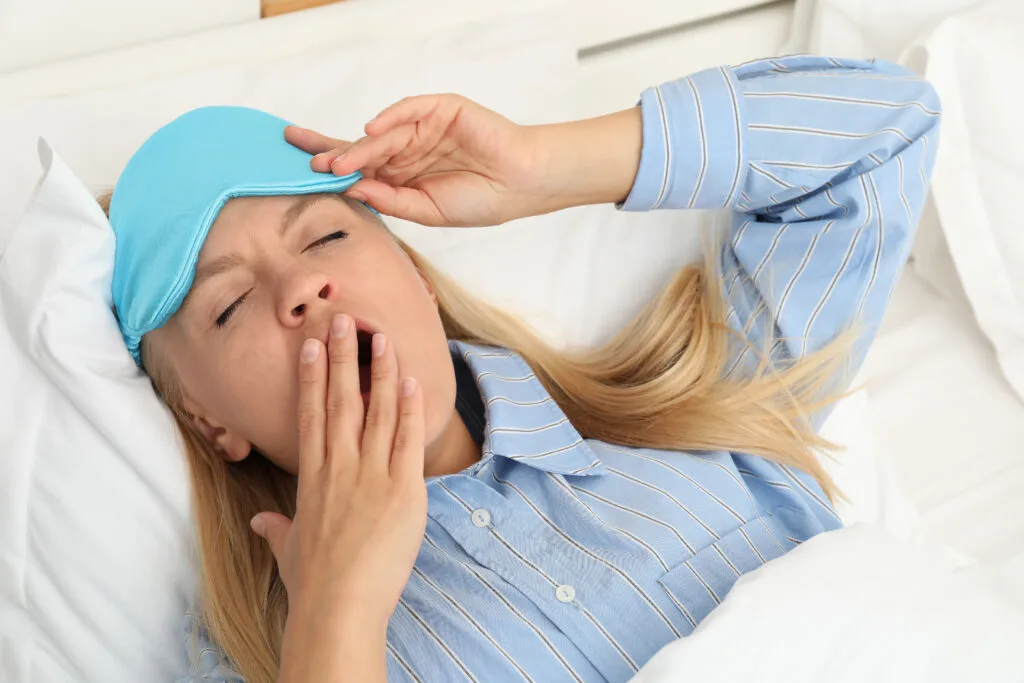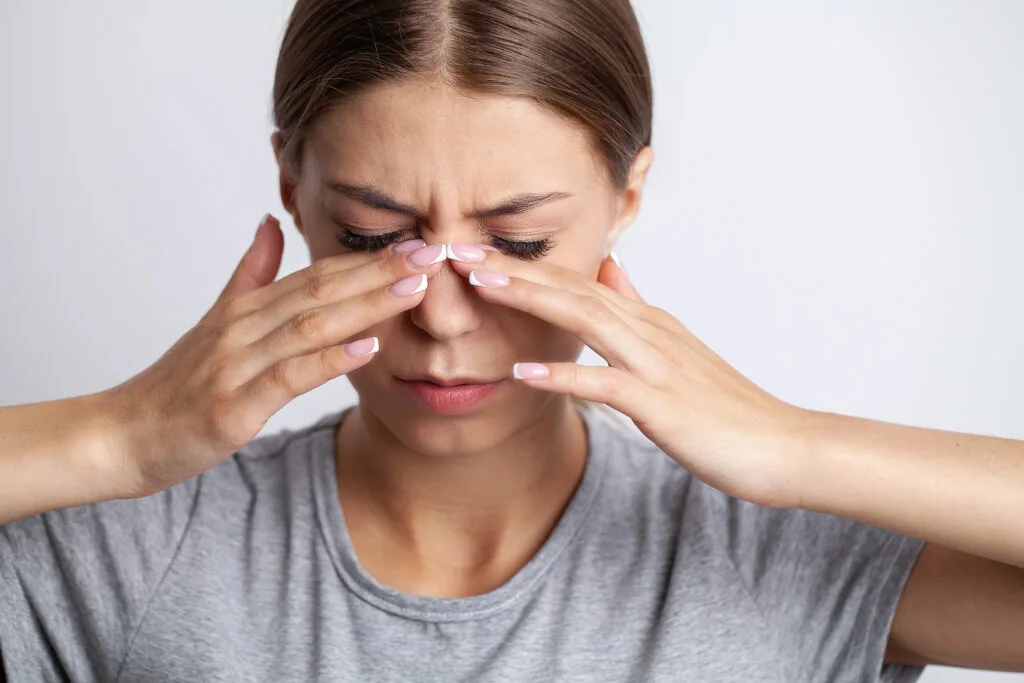Sinus issues can be more than just a daytime nuisance; they often extend their discomfort into your nights, disrupting your sleep and leaving you feeling exhausted the next day. If you’ve ever tossed and turned due to sinus pressure, congestion, or a relentless cough, you know how vital it is to find relief.
We’ll explore the reasons behind your sinus troubles and offer simple, effective strategies to improve your breathing and enhance your sleep quality. From steam inhalation and saline sprays to the right sleep posture and creating a sleep-friendly environment, these tips can make a significant difference.
Key Takeaways
- Easing sinus discomfort at night starts with understanding how sinus health impacts sleep.
- Simple natural remedies, like steam inhalation and saline sprays, can significantly improve breathing.
- Adopting the right sleep posture, such as elevating your head, can prevent mucus buildup.
- Creating a sleep-friendly environment with humidifiers and the right temperature aids sinus health.
- Daytime habits, including regular exercise and allergy management, play a crucial role in nighttime sinus comfort.
Connect Sinus Health and Sleep
Sinuses aren’t just the bane of your waking hours; they can also be the stealthy disruptors of your sleep. When sinuses flare up, the resulting pressure, pain, and congestion can make finding a comfortable position feel like a Herculean task. It’s not just about the discomfort; sinus issues can lead to sleep apnea or fragmented sleep, leaving you exhausted the next day.
But why does this happen? When you lie down, blood flow to the head increases, leading to swelling in the nasal passages. Add to that the horizontal position that prevents proper drainage, and you’ve got the perfect storm for sinus misery. So, let’s tackle these nighttime nuisances with natural remedies that are not only effective but also easy to implement.
Symptoms Interrupting Your Dreamtime
Before diving into remedies, let’s identify the symptoms that are likely causing your nighttime troubles:
- Pressure in your cheeks, forehead, or bridge of the nose
- Difficulty breathing through your nose
- Postnasal drip tickling your throat
- Coughing that worsens when you lie down
- Overall restlessness due to discomfort
Recognizing these symptoms is the first step towards finding relief and reclaiming your restful nights.

Breathe Easy: Clearing Your Sinuses Naturally
Steam Inhalation for Congestion Relief
Steam is a sinus sufferer’s best friend. It works by moistening the nasal passages, thinning mucus, and helping it drain away. Here’s how to harness the power of steam:
- Fill a bowl with hot water and lean over it, covering your head and the bowl with a towel to trap the steam.
- Breathe deeply for about 10 minutes.
- For added benefits, drop in a few leaves of eucalyptus or peppermint oil to help open up those passages even more.
Doing this before bed can greatly reduce congestion and prepare you for a more peaceful sleep.
Saline Sprays: A Simple Solution
Saline sprays are a gentle yet effective way to keep nasal passages moist and clear. They work by rinsing out irritants and thinning mucus. Here’s your quick guide:
- Opt for a saline spray without medications to avoid any potential side effects.
- Use it as often as needed — it’s just saltwater, after all.
- For a deeper clean, consider a saline rinse with a neti pot, following the instructions carefully to maintain safety and hygiene.
Hydrate to Help Sinuses Heal
Never underestimate the power of staying hydrated. Drinking plenty of fluids thins the mucus in your sinuses, making it easier for your body to clear it out. Aim for clear, pale urine as a sign you’re well-hydrated. Besides that, warm liquids like herbal tea can be soothing before bed and can help keep your nasal passages moist.
Restful Positions: Sleep Posture for Sinus Relief
Elevate Your Head: The How and Why
Elevating your head while you sleep is more than just a comfort preference — it’s a strategic move against sinus pressure. By propping up your head, you encourage sinuses to drain and reduce the blood flow to your head, which decreases inflammation in your nasal passages. Here’s what you can do:
- Use a wedge pillow or stack several pillows to keep your head elevated at a 30-degree angle.
- Avoid lying flat on your back, which can make congestion worse.
And remember, it’s not just about the number of pillows. It’s about maintaining a gentle slope to support your neck and spine as well.
The Benefits of Side Sleeping
If you find that elevating your head isn’t enough, try sleeping on your side. This position can prevent mucus from pooling in your sinuses and help with better drainage. Most importantly, if you have a deviated septum or congestion in one nostril, sleeping on the opposite side can give you some relief.
It’s these small adjustments that can make a big difference in your quality of sleep. Now, let’s turn our attention to creating the ideal environment for a sinus-friendly slumber.
Pure Air: Humidifiers and Air Purifiers
It’s crucial to breathe air that’s not just fresh, but also moist, especially when dealing with sinus issues. Dry air can irritate your sinuses, making your symptoms worse. That’s where humidifiers come in — they add moisture to the air, which can help soothe inflamed nasal passages and ease congestion. Make sure to keep the humidifier clean to prevent mold growth.
Air purifiers are another ally in your fight against sinus discomfort. They work by removing allergens like dust, pollen, and pet dander from the air. If you’re someone whose sinus issues are triggered by allergies, an air purifier could be a game-changer for your sleep quality.
When using these devices, there are a couple of things to keep in mind:
- Place the humidifier or air purifier in your bedroom to benefit from it as you sleep.
- Change filters regularly to ensure the device is effective and doesn’t circulate more allergens.
Herbal Helpers: Essential Oils to Soothe Sinuses
Essential oils can be a comforting addition to your nighttime routine. Oils like eucalyptus, peppermint, and lavender have properties that can help reduce sinus inflammation and promote relaxation. You can use them in a diffuser or apply a diluted solution topically to your temples or under your nose — just be sure to do a patch test first to avoid skin irritation.
Remember, while essential oils can provide relief, they should be used with care. Always follow the recommended guidelines for dilution and exposure, and consult with a healthcare provider if you have any concerns.
Temperature and Light: Setting the Stage for Sleep
The temperature and lighting in your bedroom can also impact your sinus health. A cooler room can help reduce nasal inflammation, so aim for a temperature that’s comfortable yet on the cooler side — around 65 to 68 degrees Fahrenheit is often recommended.
When it comes to lighting, darkness is key. Melatonin, the hormone that regulates sleep, is sensitive to light. Use blackout curtains or a sleep mask to block out any light that might interfere with your body’s natural sleep cycle and potentially worsen sinus pressure.
Creating the right environment for sleep involves:
- Keeping your bedroom cool
- Making it as dark as possible
- Ensuring the air is moist and clean

Sleep Routines and Nighttime Rituals That Benefit Sinus Health
Establishing a bedtime routine is not just for kids — it’s a practice that can signal to your body that it’s time to wind down and prepare for rest. Consistency is key, so aim to go to bed and wake up at the same times each day.
Relaxation Techniques Before Bed
- Practice deep breathing or meditation to calm your mind and body.
- Try gentle stretching or yoga poses to release tension.
- Write down any worries or to-dos for the next day to clear your mind.
These practices can help ease you into a more restful state, which is especially beneficial when sinus discomfort is at play.
Another part of your nighttime ritual might include a warm bath or shower. The steam can help clear your sinuses, and the drop in body temperature after you get out can promote sleepiness.
Dietary Do’s: Evening Eats for Easier Breathing
What you eat before bed can affect your sinuses. Spicy foods, for instance, might help clear your nasal passages temporarily, but they can also lead to indigestion that disrupts sleep. Instead, opt for light, non-inflammatory foods that won’t weigh you down or increase mucus production.
Some good evening snack options include:
- A small bowl of whole-grain cereal with almond milk
- A banana with a dab of peanut butter
- A handful of walnuts or almonds
Staying away from heavy meals and caffeine close to bedtime will also help you drift off without sinus pressure keeping you up.
Beyond the Night: Daytime Habits for Sinus Success
Your daytime habits have a significant impact on how well you manage sinus issues at night. By making some strategic choices during the day, you can set yourself up for a more comfortable sleep.
Regular Exercise for Airflow
Regular physical activity can improve your overall health and help your sinuses function better. Exercise increases blood flow and can help reduce inflammation. Just be sure to choose activities that don’t exacerbate your symptoms — swimming in a chlorinated pool, for example, might irritate your sinuses more.
Stay Allergy-Aware: Avoiding Triggers
If allergies are the root of your sinus troubles, it’s essential to keep them in check. Here are a few ways to minimize your exposure to allergens:
- Keep your living spaces clean and dust-free.
- Wash bedding regularly in hot water to kill dust mites.
- Stay indoors when pollen counts are high, and keep windows closed to prevent allergens from coming in.
By managing allergies, you can reduce the likelihood of sinus flare-ups and improve your chances of a good night’s rest.

Nature’s Toolkit: Botanicals and Supplements for Sinus Support
Turning to nature’s pharmacy can be a powerful way to combat sinus discomfort. Many botanicals and supplements possess properties that can help soothe inflamed sinuses and bolster your body’s defenses.
The Power of Pineapples: Bromelain’s Benefits
Bromelain, an enzyme found in pineapples, has been shown to reduce swelling and improve breathing in sinus patients. It’s available as a supplement and can be a helpful addition to your sinus care routine, especially after surgery or during a sinus infection. Just be sure to talk to your doctor before starting any new supplement, particularly if you’re on other medications.
Quercetin: A Flavonoid for Fighting Congestion
Quercetin is a flavonoid that acts as a natural antihistamine and anti-inflammatory. This can be particularly helpful if your sinus issues are allergy-related. Found in foods like apples and onions, quercetin supplements can also provide a concentrated dose of this sinus-supporting compound.
Signs It’s Time: When to Seek Professional Help
While natural remedies can be quite effective, there are times when professional medical help is necessary. It’s important to recognize when your sinus issues are beyond the scope of home care.
Recognizing Persistent Sinus Complications
Here are some signs that it’s time to see a doctor:
- Your symptoms last longer than 10 days without improvement
- You experience severe pain or fever
- Over-the-counter medications aren’t providing relief
- You have recurring sinus infections
These symptoms could indicate a more serious condition, such as chronic sinusitis or nasal polyps, which require medical treatment.
Finding the Right Health Care Provider
When seeking medical help, look for an ear, nose, and throat (ENT) specialist. They have the expertise to diagnose and treat complex sinus issues. Remember, getting professional help is not a failure of natural remedies; it’s about taking comprehensive care of your health.

Frequently Asked Questions
Can certain foods worsen sinus congestion?
Yes, some foods can exacerbate sinus congestion, especially dairy products, gluten, and sugar, as they can increase mucus production in some people. Paying attention to your diet and how it affects your sinuses is crucial.
How can I tell if my sinus issues are allergy-related?
Allergy-related sinus issues often come with itching, sneezing, and a runny nose. If you notice these symptoms, especially during specific seasons or in certain environments, allergies might be the culprit. An allergist can perform tests to confirm this.
Are there any risks with using natural sinus remedies?
Most natural remedies are safe, but they can interact with medications or cause allergic reactions in some people. It’s always best to consult with a healthcare provider before trying new treatments, especially if you have underlying health conditions.
What are some signs that my sleeping position is affecting my sinuses?
If you wake up with increased congestion or sinus pain, your sleeping position might be to blame. Try adjusting your position or using extra pillows to elevate your head and see if there’s an improvement.
When should I consider using a humidifier for sinus problems?
Consider using a humidifier if you often wake up with a dry mouth, throat, or nasal passages, or if your home’s air is particularly dry. This can help keep your sinuses moist and reduce discomfort.



